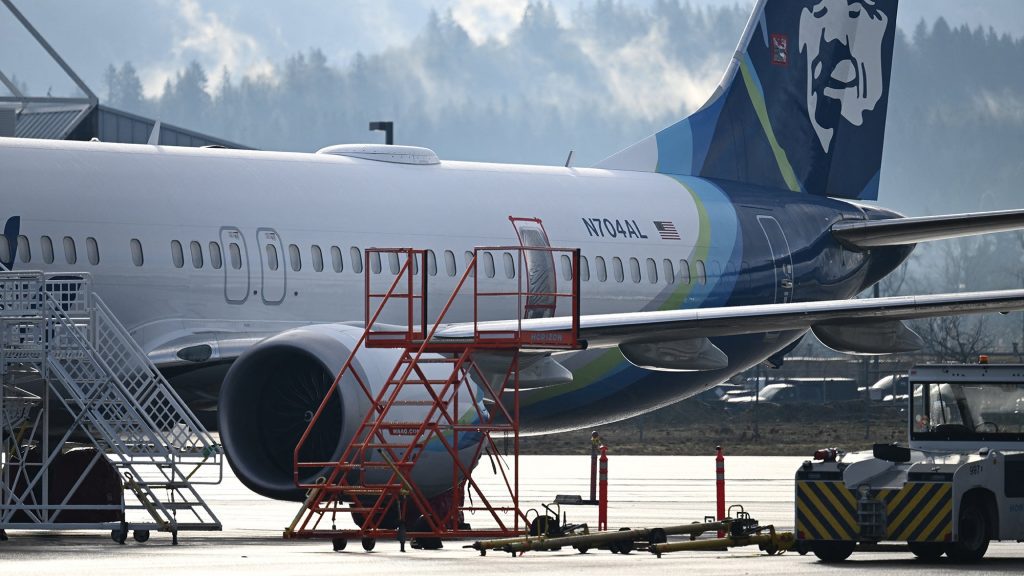Over the last two months, passengers on Boeing planes have experienced a sudden, nose-dive that causes injury, a and a wheel coming off while in the air, and an emergency door unexpectedly opening during a flight . Now, new information from a Federal Aviation Administration review of the world’s second largest commercial aircraft manufacturer may be more extensive than previously thought.The six-week examination of Boeing and its 737 Max body supplier Spirit AeroSystems revealed “many” issues with quality control at production facilities,
according to a slide presentation seen by The New York Times . In one instance, workers at Spirit were observed using Dawn dish soap on a door seal instead of lubricant. The seal was then apparently cleaned with a “wet cheesecloth.” In another case, Spirit workers were found using a hotel key card to check a door seal, which is not standard practice.Overall, out of 89 product inspections, Boeing passed only 56 of them and failed 33, according to the report. Many of the issues at the Boeing facility, according to the slide presentation seen by the
, involved the company not following “approved manufacturing process, procedure or instruction.” Others involved a lack of proper quality control documentation. Spirit failed seven inspections and passed six. At Boeing, six engineers scored an average of only 58% on a test analyzing how well they understood their company’s quality-control processes. TimesThe FAA inspection follows several high-profile safety incidents
Boeing has been in the international spotlight for months following a series of safety incidents, some of which have led to serious injuries. Just last week, a Boeing plane traveling to Japan from San Francisco was diverted after a wheel
detached from the aircraft mid-flight and landed in a parking lot, causing severe damage to several vehicles. More recently, at least 50 people on a Boeing 787 Dreamliner traveling to Australia from New Zealand were injured after a “technical event” reportedly caused the plane to suddenly nosedive and sent some passengers flying toward the aircraft’s ceiling. Thirteen of those passengers were taken to a nearby hospital. Another Boeing 737 Max leaving from Houston recently had to land shortly after takeoff because the engine sucked up plastic wrap left on the runway before departure. The door plug blowout that
ultimately led to the major FAA inspection resulted in an investigation by the National Transportation Safety Board which identified four missing bolts from the door plug before it broke. Three passengers on the Alaskan Airlines flight at the time are suing the airline and Boeing for $1 billion over allegations of negligence. Now, the Department of Justice is also conducting its own criminal investigation. This week, a former Boeing quality manager turned whistleblower named John Barnett was
reportedly discovered deceased in Charleston, South Carolina , according to the Charleston county coroner’s office, was likely due to a self-inflicted injury. The former worker, who spent 32 years at Boeing’s Charleston facility, had previously accused rushed workers ofinstalling lower-quality parts in some Boeing 787 Dreamliner models . Barnett had raised concerns about Boeingretaliating against him after he made these statements , a claim that Boeing has denied.Boeing is under investigation by multiple federal agencies
In a statement to
the FAA stated that its examination of Boeing’s production lines went “beyond [the administration’s] standard inspection process.” The results of this ongoing investigation revealed issues with non-compliance in Boeing’s manufacturing process, parts handling, and product control. The complete audit report was not made available, but the FAA announced that it will continue to have a heightened presence at Boeing and Spirit’s facilities in Renton, Washington and Wichita, Kansas respectively. PopSci, “Boeing will not be able to resume business as usual without making significant and fundamental improvements,” stated FAA Administrator Mike Whitaker. “Boeing’s leadership must commit to making substantial changes, and we will closely monitor their progress at every stage.”
Boeing acknowledged the FAA findings in a statement sent to
and stated that the company is working on “implementing immediate changes and developing a comprehensive action plan to enhance safety and quality and regain the trust of our customers and their passengers.” Spirit did not respond immediately to our request for comment, but a company spokesperson informed the PopSci that they are “reviewing all identified nonconformities for corrective action.” Times “We are fully committed to taking significant, visible action with complete transparency,” added the Boeing spokesperson.
The FAA recently issued Boeing a
90-day deadline to present a plan for improving quality control following a series of potentially hazardous incidents. This ultimatum coincided with a panel appointed by Congress to review Boeing’s safety process finding a “disconnect” between senior management and employees regarding the company’s safety culture. The panel report, reportedly indicates a “lack of awareness of safety-related measures at all levels of the organization.” Reuters If the FAA audit findings are confirmed, they will likely
further support the arguments of critics who claim that Boeing, once hailed for its exceptional engineering, is now known for prioritizing cost-cutting and short-term profits over customer safety. Boeing vehemently refuted these allegations of a company-wide shift, but the FAA audits indicate that the recent headline-making events are, at the very least, not isolated incidents. ‘Boeing will not be able to resume business as usual…’









